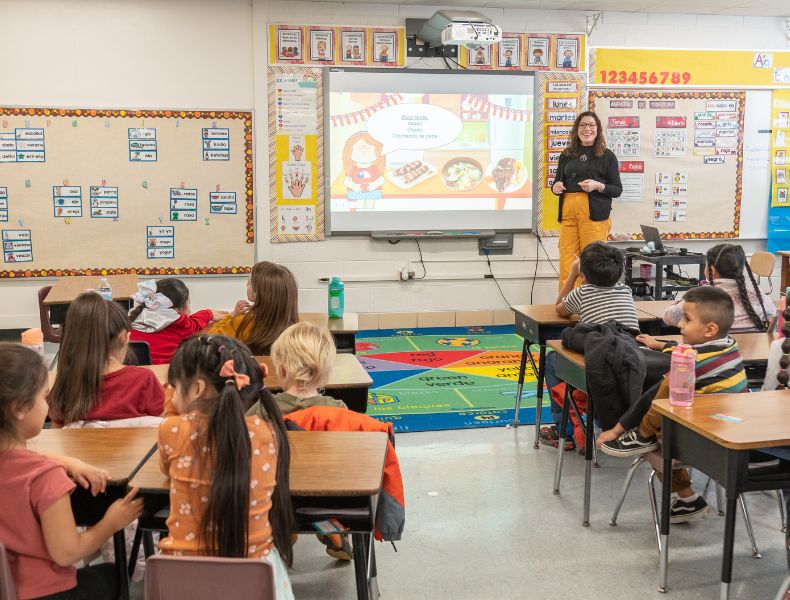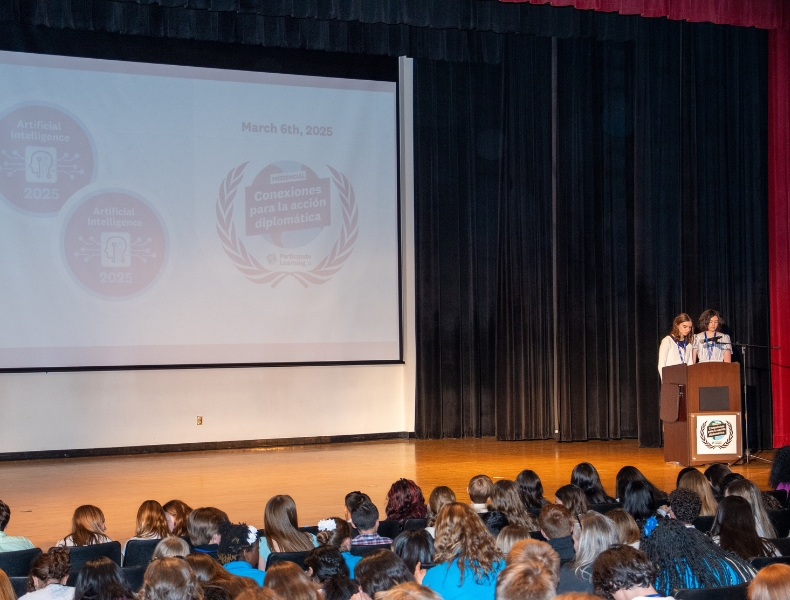By 2030, an estimated 78 million new jobs will be created—many in fields that don’t yet exist. As AI and automation rapidly reshape the workforce, academic knowledge remains essential, but it’s no longer enough. Today’s students must also develop durable, real-world skills like adaptability, communication, and critical thinking to thrive in the careers of tomorrow.
Schools across the country recognize this shift. They are rising to the challenge with creativity and commitment, working to equip students with both strong academic foundations and the human skills needed to succeed in any profession.
One way schools are doing this is by bringing new perspectives and lived experiences into the classroom through international educators. Participate Learning’s Ambassador Teacher Program, a cultural exchange initiative, supports this effort by connecting schools with experienced teachers from around the world. As part of a U.S. Department of State–designated exchange program, these educators enrich student learning and help build the real-world skills students need to succeed in their future careers.
An Evolving Workforce Means New Skills Are Needed
The job market is evolving at an unprecedented pace. According to the World Economic Forum’s Future of Jobs Report 2025, workers can expect nearly 40 percent of their current skill sets to become outdated within five years. Students must be prepared not only with academic knowledge but also with the ability to think critically, communicate effectively, and adapt quickly.
Whether students pursue careers across the world or in their local communities, they will work in environments shaped by changing technologies, shifting expectations, and people with different backgrounds and life experiences. Being able to collaborate, solve problems, and connect across differences is now essential in nearly every career field.
This shift is especially visible in states like North Carolina, where global companies are investing heavily in advanced manufacturing, biotechnology, and clean energy. Toyota is building a $13.9 billion battery plant in Greensboro that is expected to create over 5,000 jobs. Siemens Mobility has announced a $220 million rail manufacturing hub in Lexington. Biogen, Novo Nordisk, and Eli Lilly continue to expand their pharmaceutical and biotech operations across the state.
Job creation is only part of the story. These companies are shaping the future of local economies. And they need a workforce that can think on its feet, communicate across cultures, and contribute to innovation. Helping students build those skills isn’t just about giving them more opportunities—it’s about ensuring they’re ready to meet the opportunities already on the horizon.
How Ambassador Teachers Build Career-Readiness Skills
The classroom is one of the most powerful places to develop career-readiness skills—and the teachers leading those classrooms shape what students learn far beyond academics.
Ambassador Teachers naturally support career readiness through the way they teach, the experiences they bring, and the example they set. These international educators model key skills like flexibility, perseverance, and cross-cultural communication—skills students will need throughout their careers, regardless of the paths they choose.
Because Ambassador Teachers are part of a cultural exchange program, they don’t just bring subject matter expertise. They also share stories, traditions, and perspectives that help students learn how to interact with people from different backgrounds. This leads to powerful, lasting lessons that prepare students for life and work in a changing world.
Cross-Cultural and Language Communication Skills
One of the most important career-readiness skills students can develop is cross-cultural communication: the ability to work with anyone, from anywhere. This skill goes beyond speaking another language. It includes listening with empathy, adapting to unfamiliar situations, navigating differences respectfully, and expressing ideas clearly, even when perspectives vary.
Embedded within cross-cultural communication are flexibility, curiosity, and problem-solving—traits that help students succeed in any professional environment. Because Ambassador Teachers are often navigating a new culture themselves, they model these behaviors in real time. Students don’t just learn about different ways of thinking and living; they experience what it looks like to work across cultures every day.
Language proficiency further enhances these skills. International teachers often speak two or more languages fluently. Their ability to teach languages with cultural context provides students with authentic learning experiences that go far beyond vocabulary and grammar. In dual language immersion programs or world language classrooms, these teachers help students become confident, multilingual communicators.
Speaking two or more languages and learning how to communicate across cultural and linguistic boundaries are powerful career-readiness skills. It prepares students to contribute in workplaces where global collaboration, customer interaction, and teamwork are increasingly the norm.
Adaptability and Flexibility
As highlighted in the Future of Jobs Report, adaptability and flexibility are among the most important workforce skills for the coming decade. Ambassador Teachers model these traits every day as they adjust to life in a new country, learn a new school system, and build relationships within their new communities.
When students see their teachers demonstrate perseverance and openness in the face of change, it gives them a real-world example of what it looks like to be adaptable—an essential trait in a job market that’s constantly evolving.
Critical Thinking and Real-World Problem-Solving
Ambassador Teachers often bring project-based learning into their classrooms, helping students develop critical thinking skills through real-world problems and take action on their solutions. Whether it’s designing a recycling initiative, exploring global challenges, or analyzing local issues through a new lens, these projects help students learn how to break down complex topics, collaborate with peers, and take initiative.
These experiences build confidence and reinforce the idea that students can make a meaningful impact, which matters just as much in the workplace as it does in the classroom.
The Future-Ready Student
Preparing students for the future means giving them the tools to thrive in any setting—whether they remain rooted in their local communities or explore opportunities around the world. It means helping them think critically, communicate clearly, and take action with purpose and confidence.
These skills aren’t developed in isolation. They’re shaped by daily classroom experiences—by the people students learn from and the examples they see. When students build relationships with teachers who model adaptability, problem-solving, and cross-cultural communication, they begin to see what’s possible for themselves.
That’s why Participate Learning’s Ambassador Teacher Program, a U.S. Department of State–designated cultural exchange program, can be a meaningful part of the career-readiness solution. Through their presence and teaching, Ambassador Teachers help students develop the skills, mindsets, and confidence they’ll carry into any future they choose.




